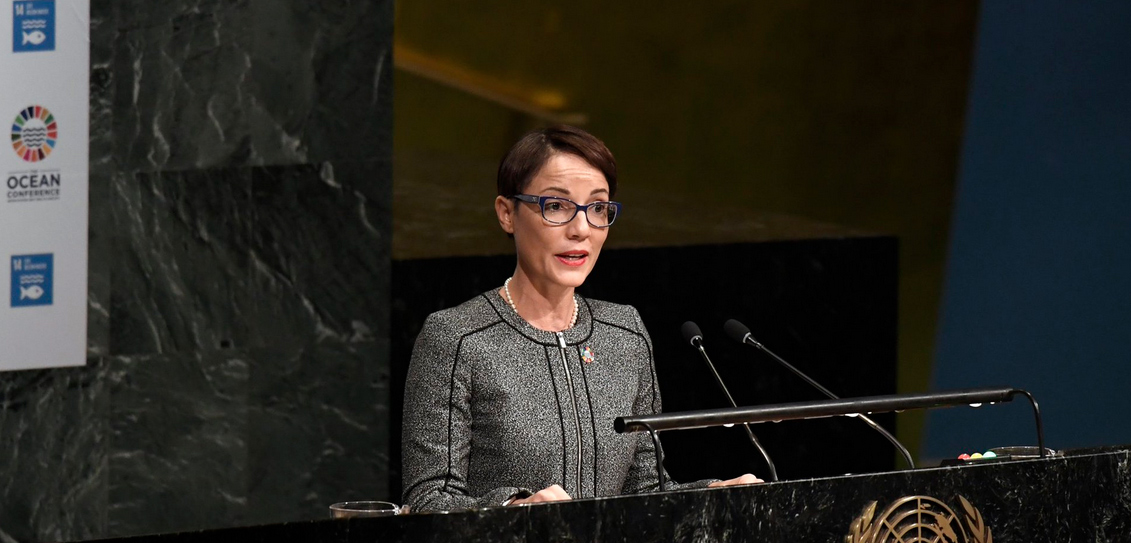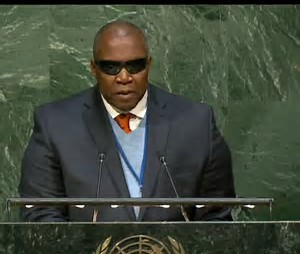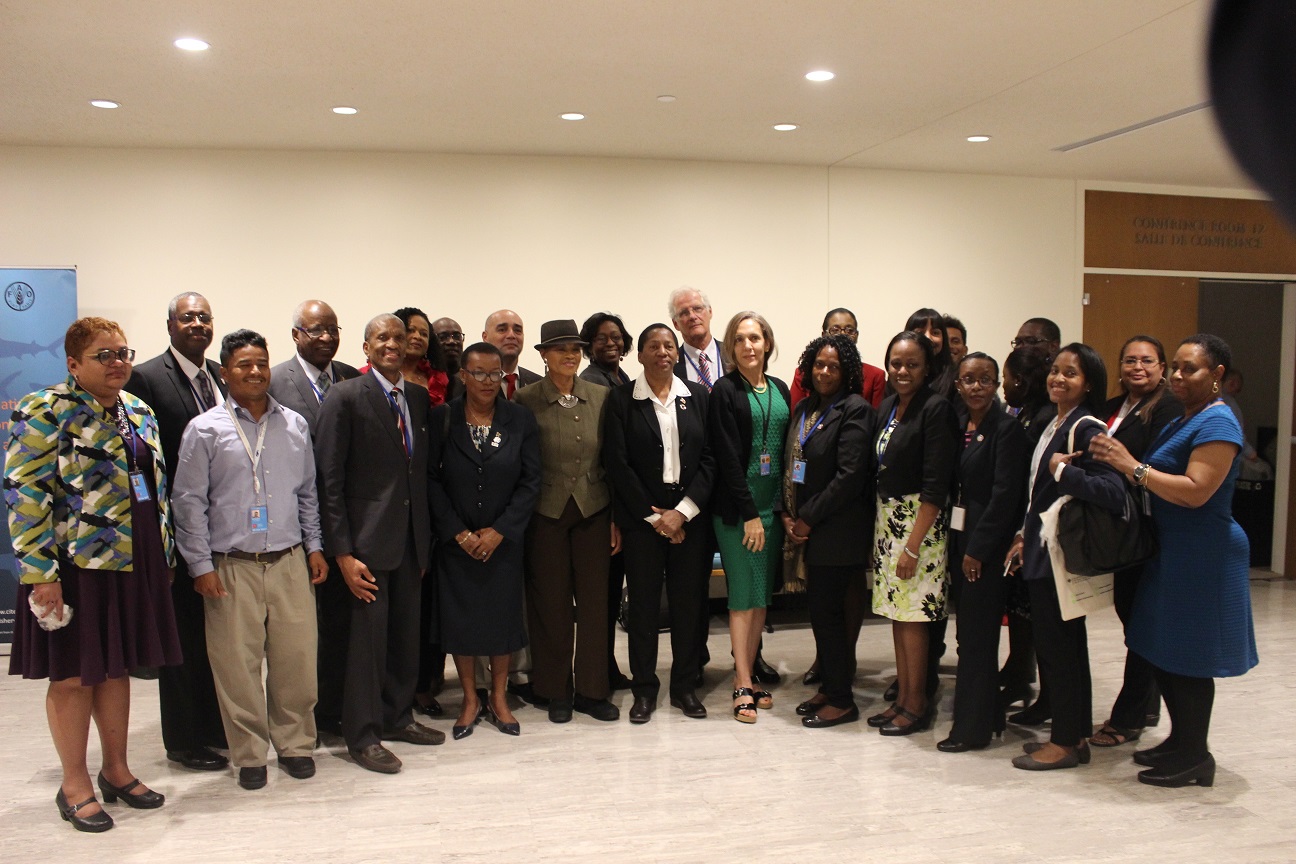Co-Presidents, On behalf of the Jamaican delegation, I extend warm congratulations to you and your Vice Presidents on being elected to lead this Conference.
Please be assured of our best wishes for a productive engagement and meaningful outcome to our deliberations. We are pleased to align ourselves with the statements made on behalf of the Group of 77 and Chin, as well as on behalf of the Alliance of Small Island States.
Recognizing that oceans, seas and coastal areas form an integrated and essential component of the Earth's ecosystem and are critical to sustaining it, we are compelled to treat them with the seriousness they deserve. The General Assembly, in its decision to convene this Ocean Conference dedicated to the consideration of Goal 14 of the Sustainable Development Agenda, is giving clear and urgent expression to our collective commitment to its implementation.
My delegation, therefore, joins others in calling for the Secretary-General to continue his efforts to support the implementation of SDG 14, including by considering the appointment of a Special Representative of the Secretary General for the Ocean. Our national imperatives are clear. Jamaica is a small island developing state (SIDS) in the Caribbean Sea.
The sea ebbs and flows and knows no national bounds. Fish, fauna and other materials, whether natural or manmade, move within and beyond areas of national jurisdiction. Our marine ecosystems are especially susceptible to damage by natural and anthropogenic factors, highlighting the importance of conservation and sustainable development of these areas.
Like many other small island developing countries, we are highly vulnerable to the effects of marine pollution, ocean acidification and the consequential impact on our coral reefs, as well as the effect of climate change on sea level rise. For Jamaica, therefore, the protection, sustainable development and management of the marine environment are not just a desirable goal.
It is a duty, indeed an obligation, which we must pursue with diligence and urgency if we are to meet the current needs of our country and those of succeeding generations. The pursuit of artisanal fisheries, which constitute a source of livelihood for entire communities, requires the sustainable management of the resources of the EEZ, including straddling and highly migratory fisheries. We should all work to ensure that this is effectively pursued. In the modern global shipping industry, Jamaica takes seriously its role as a transhipment hub.
We have welcomed the opportunities to diversify and strengthen our economic base with the progress made and prospects for enhanced growth in shipping for tourism as well as for cargo vessels. As host of the International Seabed Authority (ISA), Jamaica remains committed to the development of rules to secure the necessary environmental safeguards for deep sea-bed mining. To that end, this Conference and related activities, such as the negotiations on biodiversity in areas beyond national jurisdiction (BBNJ), are truly significant.
Co-Presidents, We are surrounded by marine areas within the jurisdiction of adjacent and opposite states. We, therefore, have several maritime boundaries and are careful to pursue the provisions of UNCLOS on maritime delimitation providing for the peaceful settlement of disputes. Our interest then, in all that the ocean signifies, is profound and enduring.
We know that in this we find common cause not only with other SIDS, but with all countries who made the commitment in The Future We Want, to “protect, and restore, the health, productivity and resilience of oceans and marine ecosystems, and to maintain their biodiversity, enabling their conservation and sustainable use for present and future generations …. ” Co-Presidents, Our common challenges require collective resolution.
This is the intent of the Call to Action which this Conference is expected to adopt. In this regard, I congratulate the co-chairpersons for their work leading to its successful conclusion. Jamaica supports the considerations that have been given to urgent action to strengthen the SAMOA Pathway and the 2030 Agenda for Sustainable Development, especially Goal 14.
We call for continued vigilance to address the issues identified as priority concerns and to pursue same on the strength of partnerships at all levels. We are particularly keen for the international community to support capacity-building for SIDs such as Jamaica.
There is need to generate pertinent data and information for establishing baselines and to inform decisions; for the transfer of technical skills, 'know how' and empowerment to design and implement sustainable development strategies at the national level. Even as we look to our partners for their support, we acknowledge our own responsibility for national development. Jamaica is pleased, therefore, to signal its Voluntary Commitments in the following ways: The first is in relation to Marine Protected Areas.
As at 2013, 15.1% of Jamaica's maritime area, including its archipelagic baseline, has been declared as marine managed areas under national legislation. The country will increase its marine protected areas by an estimated two per cent (2%) by 2019 with the declaration of the Pedro Cays and surrounding waters and the Black River protected landscape/seascape. Secondly, we are committed to the strengthening of Jamaica's policy and legislative frameworks governing protected areas.
By 2020, Jamaica will further strengthen its regime governing protected areas, including marine protected areas, with the promulgation of a new protected areas policy and overarching protected areas legislation. Co-Presidents,
I thank you






